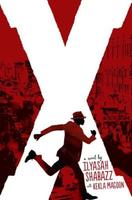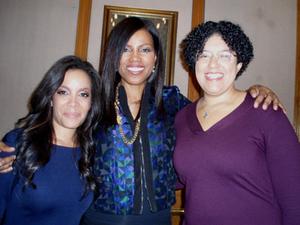Last week, on the release date of X: A Novel (Candlewick), a fictionalized account of Malcolm X's youth, co-authors Ilyasah Shabazz and Kekla Magoon joined Sunny Hostin, a legal analyst and host on CNN, for a conversation about the legendary civil rights leader.

X: A Novel focuses on Malcolm Little's youth in Lansing, Mich. His parents were Marcus Garvey followers and suspected targets of the Black Legion (an offshoot of the KKK) and others (Malcolm's father was killed on the streetcar tracks and his mother shipped off to a state hospital). Shabazz said that her nephews have told her that they feel their lives parallel that of Malcolm X. "They're going to who society says you're supposed to be as a young black man, then coming back to the importance of education, the importance of community, the importance of giving back," Shabazz said.
While The Autobiography of Malcolm X was written when Malcolm X was an adult who knew how his story turned out, Magoon explained, "putting it in the context of a novel allows teens to connect to it." Malcolm tried to run away from his parents' legacy, she added. "As a teen, he rediscovered his potential." Magoon felt that this story needed to be told in the present. "He was living each day like this is the only day," she said. "Teens can see themselves in that story."
 |
|
| CNN's Sunny Hostin (l.) with Ilyasah Shabazz (c.), and Kekla Magoon, co-authors of X: A Novel. | |
Hostin asked the authors about their decision to use "the n word" in the book, a word she chooses not to use herself. Magoon pointed out that Malcolm X used the word in his own writings, and that the use of "the n word" by his history teacher, Mr. Ostrowski, was a turning point. When the teacher asked Malcolm Little, who got the best marks in Mr. Ostrowski's overwhelmingly white classroom, what he wanted to be, Malcolm answered, "A lawyer." The man responded, "This is the real world, boy.... Be as good as you want in the classroom, but out there, you're just a n-----." The scene appears nearly verbatim in The Autobiography of Malcolm X. "That was a throwaway moment for Mr. Ostrowski," Magoon pointed out. "That says a lot about how much power there is in words like that. Malcolm internalized it. He had to fight against that to rise back up. For Malcolm, it was years of making bad choices."
During a question-and-answer period from the audience, a comment came up about one of Malcolm X's last interviews, in the Village Voice with Marlene Nadle ("Malcolm X: The Complexity of the Man in the Jungle"), in which he said, "You have to wake the people up first, then you'll get action." Nadle responded, "Wake them up to their exploitation?" "No," answered Malcolm X, "to their humanity, their own worth, and to their heritage."
Shabazz identified the audience member as Steve Clark of Pathfinder Press, who'd published many of her father's works. She argued that this is where adults have let down their youth. "We need to take responsibility," she said. "We need to teach them their history, what they have contributed." Another member of the audience came because Shabazz had been his 11th-grade substitute teacher and had loaned him The Autobiography of Malcolm X "for a week--she needed it back," he said to laughter from the crowd. Now he's a social worker with a master's degree from Columbia University.
At various points in the conversation, Hostin, Shabazz and Magoon referred to recent protests in Ferguson, Cleveland and New York. One member of the audience wondered how they could "channel that activism into a change in policy." He noted the fizzling of the "Occupy" movement, and wondered how we could keep this energy going. There were no easy answers. "The kids protesting today could read Malcolm's speeches and feel resonance with them now," said Magoon.
When Hostin asked Magoon what she'd like readers to take from X: A Novel, she hoped most of all that they'd enjoy it. Then Magoon added, "You can be anyone you want to be. Look how bad Malcolm's life was at certain moments, and look what he did. We all have that potential--that's something Malcolm X repeated over and over in his own ministry." --Jennifer M. Brown

